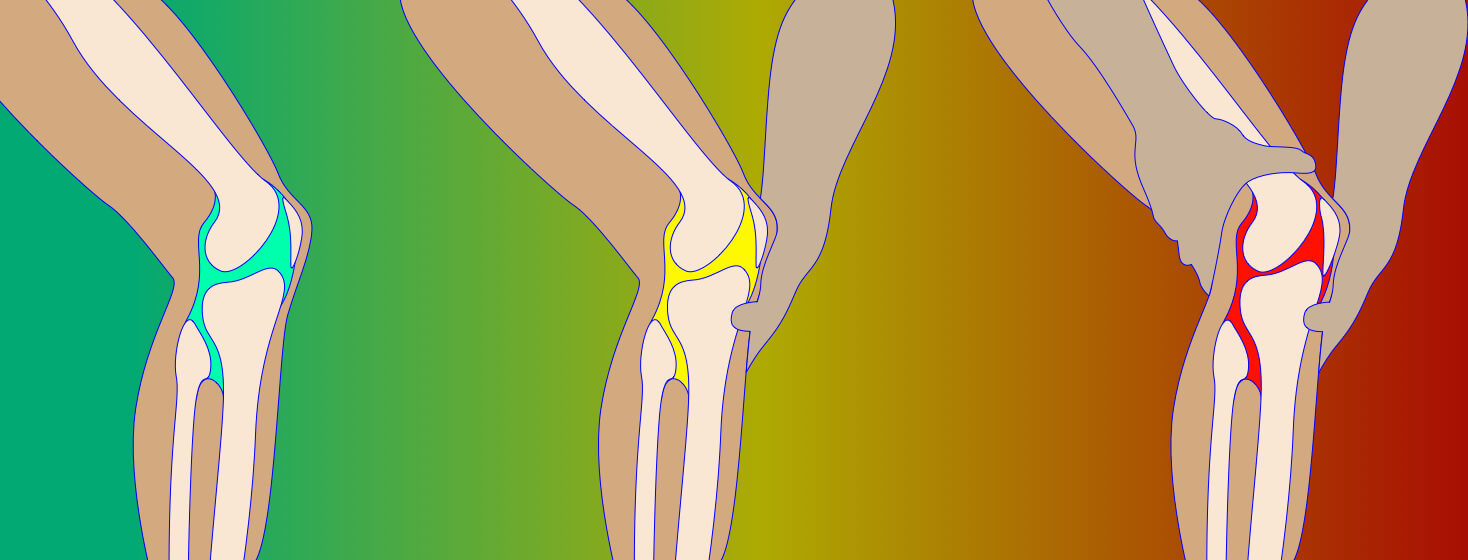Considering Knee Replacement Surgery When Living with MS
Living with chronic disease isn’t fun. Living with more than one disease can be challenging. Living with multiple chronic and debilitating diseases can really suck.
I was diagnosed with multiple sclerosis in 2005 and rheumatoid arthritis in 2007. In 2010, I hurt my knee while painting inside the house and sought treatment from an orthopedist for the first time. The doctor injected my knee with corticosteroids to reduce inflammation. He also mentioned that I had mild osteoarthritis in my knee as seen on x-ray.
Steroid injections in my knees followed by hyaluronic acid
In the years since that first steroid injection, I’ve consulted with the same orthopedist a number of times. While my osteoarthritis remained mild, treatment consisted of steroid injections in each knee at different times. When my OA progressed to a moderate stage, my orthopedist offered a different type of injectable treatment option: a series of hyaluronic acid. Both knees received this treatment at different times. These injections made such a positive difference that I didn’t need to see my doctor for years between attacks.
My osteoarthritis has progressed
My knee pain and disability have gotten worse again, so I went back to my doctor. This time the x-rays showed that my OA has progressed significantly. I officially have lost enough cartilage, and a portion of my bones are touching in my right knee and my left knee is not much better. The doctor agreed to try the hyaluronic acid injections again, but he was clear that we will need to change the discussion to total knee replacement if and when this treatment doesn’t work.
What does osteoarthritis have to do with my MS?
One of my more noticeable MS symptoms is spasticity. It is something I spend a lot of time trying to manage through medication, modified activity, intentional stretching, and gentle movement. I’ve found that cycling has helped both my spasticity and the arthritis in my knees in recent years. Additional MS symptoms that fluctuate include weakness in the legs and impaired balance. A portion of the testing for these symptoms include gait analysis.
Impact on my gait
Knee osteoarthritis (OA) can impact gait – a person’s pattern of walking. During one neurological examination, I remember having difficulty walking on my tiptoes. I just couldn’t stay up on one of my feet as I walked. It wasn’t an MS issue; it was a problem with OA.
Which of my symptoms are cause by MS vs. OA?
I’ve often thought that spasticity caused by MS puts additional strain on joints in my lower limbs. There have been times that it feels like the muscles are pulling in opposite directions and that the joints become limited in their motion. They become stiff and sometimes feel unstable; symptoms can be caused by OA.
There is not much research available that explores any potential connection between OA and MS. Whether symptoms of MS have contributed to the “wear and tear” of my knees, I don’t know. What I do know is that the thought of knee replacement surgery and recovery is frightening. My hope is that spasticity, weakness, and impaired balance would not hinder recovery.
Potential outcomes of knee surgery for people with MS
In searching for relevant information in anticipation of almost certain total knee replacement in the future, I did find one research paper published in the International Journal of MS Care in 2018 that discusses outcomes in patients with MS who underwent knee or hip replacement. The number of retrospective cases analyzed was small with only 30 patients.1
Complications related to surgery
Complications related to surgery were reported for 10 patients; two of which had more than one complication. Researchers note that “complications were relatively minor and treatable: pneumonia in two patients, superficial wound infection in one, urinary tract infection in two, deep vein thrombosis in one, urinary retention in one, and anemia requiring transfusion in one.”1
MS relapses
No MS relapses were recorded and there was no indication that spasticity worsened after surgery which I was glad to read. However, two patients required additional surgery due to knee joint infection and one patient due to knee joint loosening not associated with infection.1
Joint pain
Twenty patients who completed questionnaires prior to surgery reported joint pain. After surgery, sixteen of them (80%) reported improved joint pain while two (10%) reported that surgery did not help their pain, and two were unsure. Five patients (25%) were free from joint pain at their last follow-up visit. That implies that about half the patients in this small study had some joint pain improvement but not total relief of pain following surgery.1
Would these patients recommend surgery to others?
These are small patient numbers but it is helpful to me to understand what other patients have experienced. When asked if they would recommend surgery to other patients with similar circumstances, 70% responded that they would recommend it, 15% would not, and 15% were unsure. I’m not sure whether to be encouraged by this information or discouraged.1
A final point that the researchers made is that “further studies are needed to optimize patient selection and operative techniques in patients with MS who are candidates for hip or knee replacement.”1
A question for my orthopedist
The next time that I visit my orthopedist I know what one of my questions will be: Have you successfully completed total knee replacement surgery on a person with MS and what was their outcome?
The more I think about it, the more nervous I become. But once the osteoarthritis pain and disability has progressed to a point where I can’t manage it anymore, something will need to be done.
What’s your experience? As a person with MS, have you undergone a total joint replacement? If so, what was the outcome? Please share your story in the comments below.
Be well,
Lisa
Read my other articles on MultipleSclerosis.net

Join the conversation